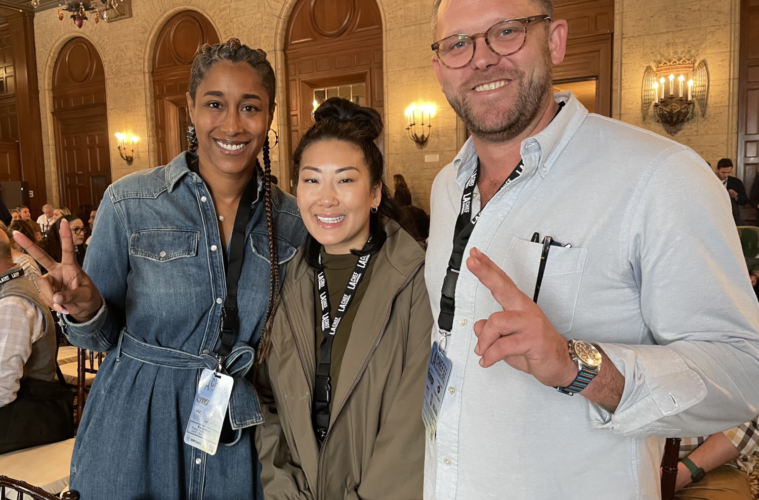Mental health, life work balance, embracing technology and retooling the traditional restaurant model were the hot topics at this week’s LA Chef Conference, which brought together 630 of L.A.’s top chefs, restaurateurs and vendors including Wolfgang Puck, Suzanne Goin, Mary Sue Milliken and Tim Hollingsworth for a look at the sustainable future of restaurants.
The massive event took over three floors of the historic Jonathan Club in downtown Los Angeles and included a pop-up lunch on the rooftop garden with 17 of L.A.’s hottest chefs like Stephanie Izard, Burt Bakman and Mei Lin’s Daybird. It was a full day of panels on the future of food, as well as a chef art auction, which raised $9,650 for No Us Without You. A second food festival took place at the afterparty with seven food stations and eight pastry chef stations.
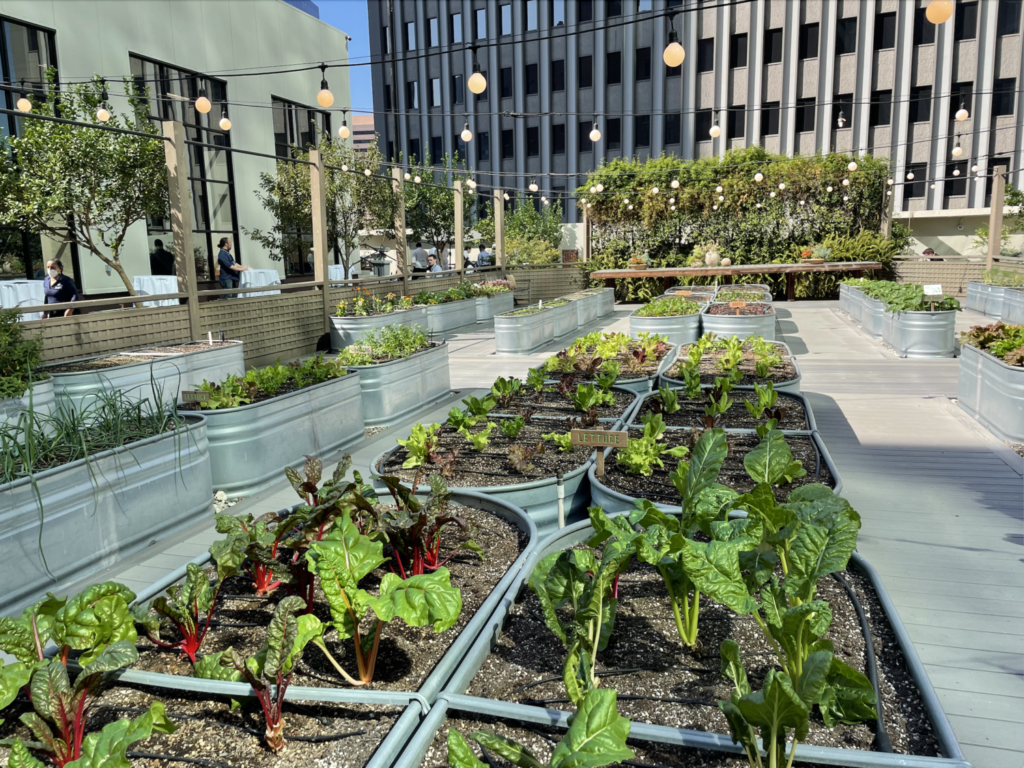
Rooftop garden at the Jonathan Club (Michele Stueven)
The consensus was clear that there’s no such thing as going back to the pre-pandemic model of dining. With a challenging labor shortage and supply chain issues, there’s no more barking at employees or projectiles in the kitchen. Conversations from the conference suggest that keys to a sustainable restaurant future are smaller dining spaces and menus, hybrid retail and dine-in concepts, mental health and lots of delivery. With many people still working at home, the coffee table is the new dining table.
“We’re all psycho for being in the restaurant industry,” Alex Canter, the fourth generation member of the Canter’s Deli dynasty who co-founded Nextbite, a virtual restaurant concept to help generate revenue, told the sold out crowd during one of the morning panels.
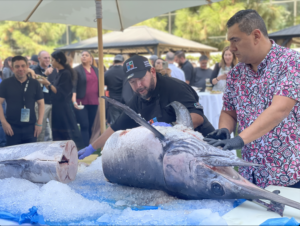
Lunch at the LA Chef Conference (Michele Stueven)
“If you’re lucky you can achieve 3 or 5% margins right now,” he said. “My family’s business has been scraping by, even though it’s one of the most historic and largest restaurants in Los Angeles. We barely hit a 1- to 2% profit average for the last 15 years. We are struggling. We have 150 full-time employees, it’s a 24-hour operation in a 30,000 square foot space. It’s very difficult to take an old school business and make it work in today’s model. My grandfather worked in the restaurant for 65 years before he passed away. My father dropped out of high school to take over the family business and has worked there seven days a week for 42 years and has never taken a vacation, working an 80- to 100-hour work week. He used to say, ‘If you make good food and take good care of your customers, everything will work itself out.’ That’s just not the case anymore. If you’re not paying attention, you’ll get left behind in the dust. The typical restaurant layout 50 years ago was traditionally 30% back of house and 70% front of house. The future restaurant model is flipped — smaller square footage, smaller operation specifically designed for take-out food. There will always be the need for dining experiences, but I think a lot of consumers want to interact with restaurants in a new way.”
Being the young sprout with big ideas in a traditional business, it took some time to convince the family to embrace technology. In 2008, Canter’s foot traffic was down 20% and on the verge of not making the next payroll. It was the aha moment that they had to change something and lean into technology. Alex brought in a variety of different delivery and catering apps with about 14 different platforms running out of the kitchen. Those services brought incremental revenue into the business. They ended up over the next 10 years growing delivery to become more than 30% of their revenue from the apps.
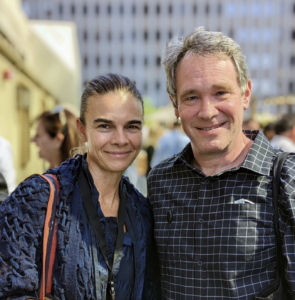
Restaurateur Suzanne Goin and LA Chef Conference producer Brad Metzger (Suzanne Lanza/blueladybugstudio)
How family is regarded and interwoven into the restaurant industry has changed with an emphasis on mental health since the pandemic.
“My husband and I started out in fine dining in the three Michelin star world,” Yangban Society chef and partner Katianna Hong told the crowd during the Conceptualizing Tomorrow: The Future of the Restaurant Model panel. “But when we decided to have a family, we started to evaluate what was important to us and how we wanted to spend our time. We knew our hearts were in restaurants because we were chefs, but we wanted to look at things differently in order to achieve work/life balance. We created a Korean American deli, where the community could come together in a neighborhood spot that is half dining, half retail. It’s very explorative for us. We wanted to run with a smaller staff and a smaller crew, and still provide a quality level of service in a choose-your-own-adventure level of dining.”
With that popular hybrid model, which also is featured at Brian Bornemann’s Crudo e Nudo in Santa Monica, there is plenty of opportunity for evolution and a personal experience for the diner and the staff, with room to grow and space to breathe.
“Traditional restaurants are built on this 150-year-old model when labor was cheap, food was cheap and rent was cheap,” Bornemann said during the panel, which was adroitly moderated by Paul Pruitt, founder of Principal New School Consulting. “We’ve just stuck with that model this whole time. We were pandemic-born and were able to get a reset of a new normal. If we’re going to fail, let’s at least not fail in the old model. The way that we think about humanizing the work is important now, as we face staffing shortages. We want our staff to have a quality of life. We picked the smallest space possible, and did everything ourselves and it grew organically. Now we have 15 employees here and six more in New York. What was important to me was a four-day workweek and giving people three days off.”
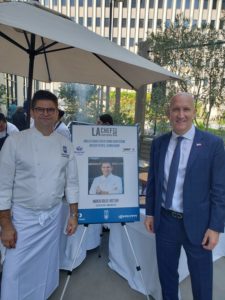
Jonathan Club Executive Chef Andreas Roller left, and club manager Francois Grand (Courtesy LA Chef Conference)
Still, navigating the balance in a new normal is a challenge. According to Kwini Reed, co-owner of Poppy & Seed and Poppy & Rose with husband Michael, work/life balance is a struggle, but communication and transparency with staff helps.
“Five days after we had our child, three people on the line walked out,” she said during the conference. “Michael was a consultant running a restaurant and a catering company, and being a husband and father. The pandemic gave us a chance to slow down and realize what was the most important to us. We saw it from all sides — the husband, the wife, the kid and family members.
“In order for us to have a successful business we need to have whole human beings running our business,” she said. “We actively work together to make sure that everybody gets to take their time off. Michael and I will come in if somebody needs personal time off to see their kid turn two or their mother turning 90 or see their kid play soccer. If you don’t have child care for your kid, bring them to the restaurant and we’ll figure it out. You need to take time for your mental health. Our industry can be a little bit toxic. It’s not human for us to just work all the time, so we actively make sure that we take time to rest. We make sure that the staff are not afraid to ask for time off and try to get back to the human side of everything we do. We try to put the human side in front of us before profit and see them as human beings, not just someone who works for us. It creates a more harmonious and productive environment.”
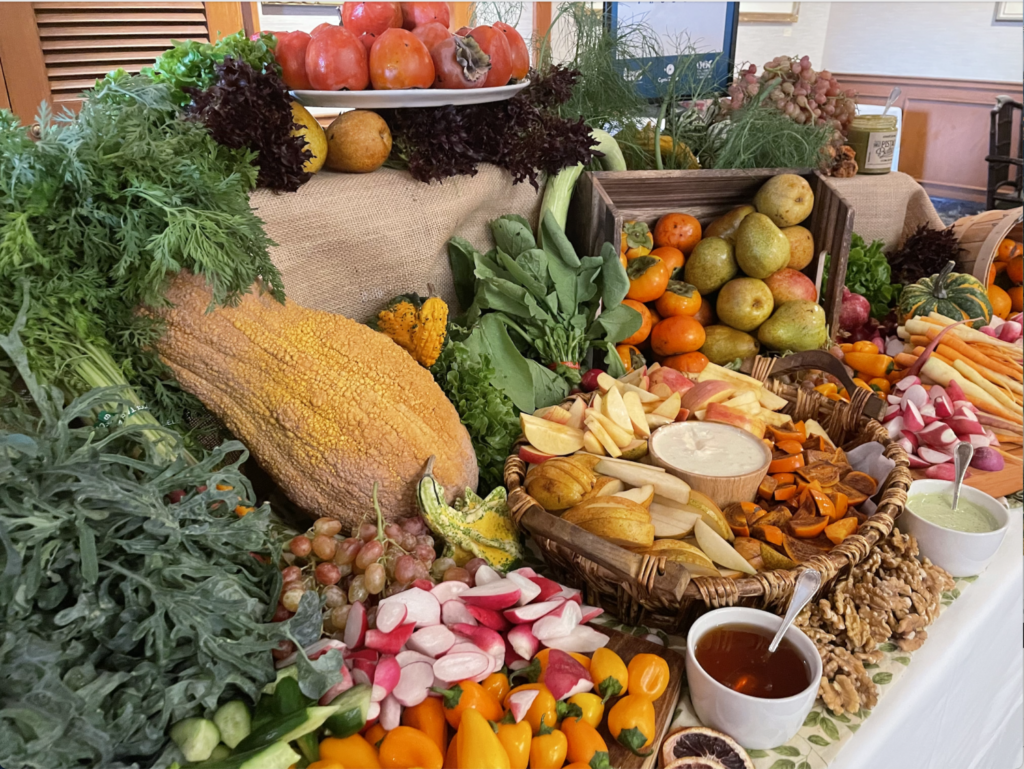
Local farm spread from Worldwide Produce at LA Chef Conference (Michele Stueven)
Advertising disclosure: We may receive compensation for some of the links in our stories. Thank you for supporting LA Weekly and our advertisers.

